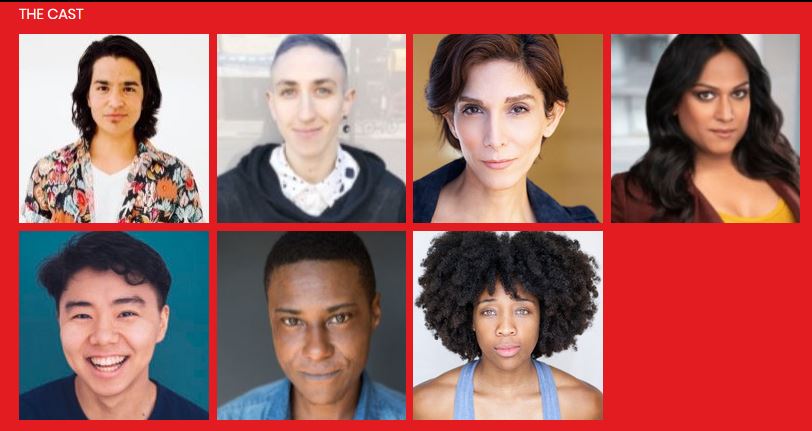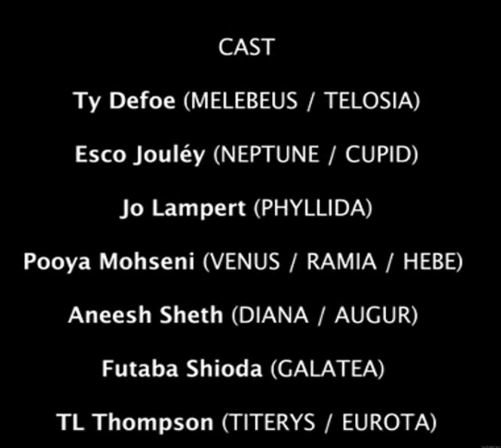Last week the Red Bull Theater in conjunction with WP Theater presented a reading of MJ Kaufman’s Galatea Or Whatever You Be. This is the contemporary book end to their reading of John Lyly’s 16th Century play, Gallathea. If you want to read my overly long response to the Lyly plan, have at it here!
Lyly’s play pushes the Elizabethan limits on gender roles and gender identity fairly clearly and that came to some surprise to this writer when I watched the play. But given the necessity of having male actors play female roles in that era, in retrospect it could be anticipated that some gender fluidity may have been ‘tolerated’ at the time.
But Kaufman’s Galatea, described at one point as “loosely based on John Lyly’s 1585 play…” makes its magic with contemporary language and pulls the play into current 21st Century gender identity acceptance and certainly tries to lead the way to where society eventually needs to go.
Director Will Davis makes the most of the modern interpretation…the play gets pretty boisterous at times…the players much more animated…and the story simply runs forward without distraction.
Again the two main characters are Galatea and Phillyda, marvelously played by Futaba Shioda and Jo Lampert respectively. Galatea and Phillyda are two young woman who are dressed in boy’s clothing and sent to the woods by their fathers…because their village is faced with a historical legacy of placating an angry Neptune by sacrificing a fair virgin every five years…and the five year ‘festival’ is just about upon us.


In the woods, you can be who ever you want to be.
Needless to say the two encounter each other in the woods and intend to learn how to be a boy from the other. But of course it doesn’t go as planned as they each start to fall for the other. And again their word play and conversations reveal their ‘true identities’ to us the knowing audience although not quite apparent to each other…but being modern characters they go with their feelings. Kaufman has a little fun here in as the characters talk about being boys playing girls being boys ala both Elizabethan practice and the casting for this presentation. The writing is exceptionally well done and both actors play it to the hilt, really bringing out all of the nuances, irony, and humor in the text. One thing that I did miss in this modern interpretation is some of the poetry inherent in Lyly’s dialogue for Galatea and Phillyda in the original. But it would be somewhat out of place here.
how I love, whatever you be…
And the under story here is more direct as it is plain how Cupid takes umbrage with being spurned by the nymphs of the goddess Diana and decides to have a little fun with them. So after a few well spent arrows, the nymphs, who are ‘normally devoted to “lesbian separatist solidarity,”’ are smitten with the Galatea and Phillyda as boys. And all types of tricks and nonsense ensues.
The other character who has much to say despite little time on stage is Hebe, the lucky virgin who is selected to be the sacrificial offering but is ultimately spurned by Neptune. Again she runs the rant from not being fit for the role since there are fairer maidens about, to being angry that she has been spurned. But she is also self aware that she is a character in a play as she gloats that she has the longest solo speech! Hebe is incredibly on point and played by Pooya Mohseni who double dips by also playing the goddess Venus and a nymph, Ramia, at other points in the play.

And then we have the denouement where everything is revealed, everyone dies, or everything gets made right. This one is a combination of the first and last…with some ambiguity to boot.
Venus shows up to retrieve her son Cupid from Diana…she convinces Neptune to drop his five year retribution on the town and essentially blesses the union of Galatea and Phillyda, but to satisfy the social mores of that time and even of the contemporary era, she promises to change one of the girls into a boy at the church before their wedding, to satisfy the presumed heterosexual nature of marriage. Except like Hebe, these young woman are aware of their place in the play and announce that unlike that other play, they just aren’t going to show up at the church and will live their lives as they desire.

Now, Kaufman has played with gender fluidity through out the play. And director Davis pushed it even further with his casting…filling the roles with incredible actors despite what an audience might expect for the gender of each or any character. It works really well here and I imagine this will eventually be less a surprise on stages in the future.


OK…this got pretty long too…it’s a good thing that Kaufman dropped the whole stranded brothers gig…it doesn’t work anyway. LOL!

